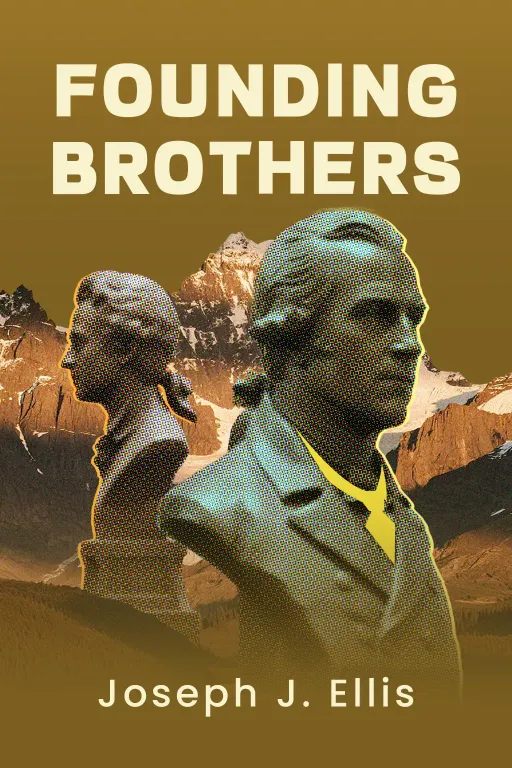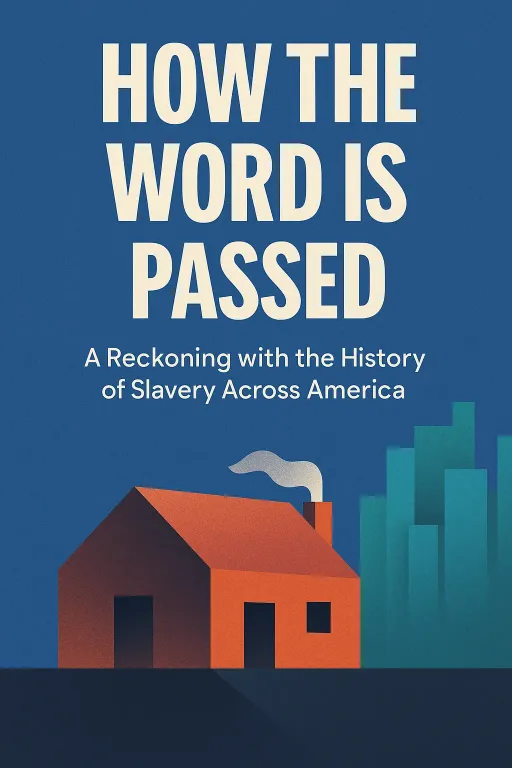
Founding Brothers
11 minThe Revolutionary Generation
Introduction
Narrator: On July 4, 1776, after the Continental Congress approved the final text of the Declaration of Independence, a moment of grim reality set in. The men in that room were now traitors to the British Crown, their lives forfeit if their rebellion failed. Benjamin Harrison of Virginia, a large man, turned to the much smaller Elbridge Gerry of Massachusetts. He joked that when they were all hanged, he would have an advantage. His great weight would mean a quick death, while the lighter Gerry would be left to "dance in the air for an hour or two." This morbid humor reveals a crucial truth: the American Revolution was not a foregone conclusion. It was a wildly improbable, high-stakes gamble undertaken by a small group of men who were acutely aware that they were shaping history, for better or for worse.
In his book Founding Brothers: The Revolutionary Generation, historian Joseph J. Ellis argues that to truly understand the founding of the United States, one must look beyond the grand documents and abstract principles. The real story lies in the intense, personal, and often contentious relationships between these key figures. Their friendships, rivalries, backroom deals, and calculated silences were the crucibles in which the American republic was forged.
The Revolution's Central Paradox
Key Insight 1
Narrator: The revolutionary generation faced an almost impossible challenge. The very ideas they used to justify independence—a deep suspicion of centralized authority and coercive government power—made the task of creating a stable, unified nation incredibly difficult. In essence, the arguments for revolution undermined the future government's legitimacy. Joseph J. Ellis highlights that while leaders like Washington saw America's vast potential, the short-term reality was precarious. The nation in 1789 was a "work in progress," a fragile union of states with competing interests, held together by a new and untested Constitution.
Ellis argues that the genius of this generation was not that they were infallible demigods, but that they were a diverse and flawed collective. The clashing personalities and ideologies of figures like the pragmatic Washington, the visionary Hamilton, the republican Madison, and the philosophical Jefferson created a dynamic equilibrium. Their mutual imperfections and competing ambitions checked each other, preventing any single ideology from dominating. This messy, argumentative process, full of personal friction, was precisely what allowed them to navigate the paradox of creating a strong nation founded on anti-government principles.
The Code of Honor and the Price of Politics
Key Insight 2
Narrator: Nothing illustrates the personal intensity of early American politics better than the fatal duel between Aaron Burr and Alexander Hamilton. On July 11, 1804, the sitting Vice President, Burr, and the former Secretary of the Treasury, Hamilton, met at dawn in Weehawken, New Jersey, to settle a dispute with pistols. This was not a sudden quarrel but the culmination of a long and bitter political rivalry. Hamilton had for years privately and publicly attacked Burr's character, viewing him as an unprincipled and dangerous opportunist—a "Catiline of America" who threatened the republic.
When Burr lost the New York gubernatorial race, he blamed Hamilton's "despicable opinion" of him and demanded a retraction. Hamilton, bound by a rigid code of honor and a genuine belief that Burr was a threat, refused to apologize for what he felt were justified criticisms. The ensuing exchange of letters, mediated by their seconds, became a verbal duel that made the physical one inevitable. Ellis explains that while accounts of the duel conflict, the evidence suggests Hamilton fired first and intentionally missed, aiming to satisfy honor without bloodshed. Burr, however, took careful aim and mortally wounded Hamilton. The duel destroyed Burr's political career and transformed Hamilton into a martyr for the Federalist cause, demonstrating in the most tragic way possible that in the early republic, politics was deeply personal, and character was a matter of life and death.
The Necessity of the Backroom Deal
Key Insight 3
Narrator: In the summer of 1790, the young American government was on the verge of collapse. Congress was deadlocked over Alexander Hamilton's financial plan, which proposed that the federal government assume the states' Revolutionary War debts. Southern states like Virginia, led in Congress by James Madison, fiercely opposed the plan, seeing it as an unjust power grab that would benefit northern speculators. Hamilton was in despair, threatening to resign and convinced the union would dissolve without his plan.
Seeing the crisis, Secretary of State Thomas Jefferson stepped in. He invited his rival Hamilton and his friend Madison to a private dinner. Over wine and food, a historic bargain was struck. As Ellis recounts in "The Dinner," Madison agreed to stop blocking the debt assumption bill in Congress. In exchange, Hamilton promised to use his influence to ensure the permanent national capital would be located on the Potomac River, a major symbolic and political victory for the South. The deal worked. The Residence Bill and the Assumption Bill both passed Congress weeks later. Jefferson would later express regret over his role, but the Compromise of 1790 was a masterclass in political pragmatism. It showed that for the fragile nation to survive, lofty principles sometimes had to be traded in quiet, backroom bargains.
The Original Sin and the Deliberate Silence
Key Insight 4
Narrator: In February 1790, two Quaker delegations appeared before Congress with petitions demanding an end to the African slave trade. This act shattered the unspoken agreement among the founders to avoid the explosive issue of slavery. The petitions ignited a firestorm of debate. Southern representatives, like James Jackson of Georgia, argued that the Constitution protected slavery and that their economy would collapse without it. They raised the specter of racial conflict and insisted that Congress had no authority to interfere.
Ellis shows how James Madison, a slave owner who personally found the institution abhorrent, masterfully maneuvered to defuse the crisis. His primary goal was not abolition but the preservation of the union. He guided a committee to produce a report that ultimately affirmed a devastating conclusion: Congress had no authority to interfere with slavery within the states. This decision, which Ellis calls "The Silence," effectively removed the nation's most profound moral and political contradiction from the national agenda for another generation. The founders, for all their revolutionary rhetoric about liberty, chose unity over justice. They kicked the can down the road, a decision that allowed slavery to become more deeply entrenched, making the eventual reckoning in the Civil War all the more bloody and inevitable.
The Friendship That Defined a Nation
Key Insight 5
Narrator: The most complex and revealing relationship among the founders was between John Adams and Thomas Jefferson. They were the "odd couple" of the Revolution: Adams, the stout, vain, and brilliant New England lawyer; Jefferson, the tall, reserved, and idealistic Virginia aristocrat. They collaborated closely in the Continental Congress and as diplomats in Europe, forming a powerful bond. However, the rise of partisan politics in the 1790s turned them into bitter rivals. The 1796 election saw Adams narrowly defeat Jefferson, making them president and vice president from opposing parties, an awkward and tense arrangement.
Their rivalry peaked in the vicious election of 1800, which Jefferson won. For over a decade, they remained estranged, their friendship seemingly broken by political betrayal. Yet, in 1812, they began a correspondence that would last the rest of their lives. In 158 letters, they debated history, philosophy, the nature of aristocracy, and the legacy of the revolution they had created together. They argued, explained themselves, and ultimately rediscovered their mutual respect and affection. In a final, almost unbelievable act of historical poetry, both men died on the exact same day: July 4, 1826, the fiftieth anniversary of the Declaration of Independence. Adams's last words were reportedly, "Thomas Jefferson survives," unaware his old friend had passed away just hours earlier. Their intertwined lives—from collaborators to rivals to reconciled friends—mirror the journey of the nation itself.
Conclusion
Narrator: The central takeaway from Founding Brothers is that the American republic was not the product of a divine plan or a single, unified vision. It was forged in the crucible of human relationships. The nation's early successes were born from argument, compromise, and the managed conflict between brilliant but deeply flawed individuals. Their ability to disagree vehemently on policy yet maintain a union—as seen in the dinner compromise—was their greatest strength.
Conversely, their greatest failure—the "silence" on slavery—came from a collective decision to avoid a conflict they knew they could not win without shattering the nation. Joseph J. Ellis leaves us with a challenging thought: the founding generation bequeathed a legacy not of settled answers, but of an ongoing argument. They established a framework for debate, leaving it to future generations to confront the contradictions they could not resolve. The question they leave for us is whether we can still engage in that foundational argument with the same fierce urgency, and yet the same ultimate commitment to the union, that they did.









